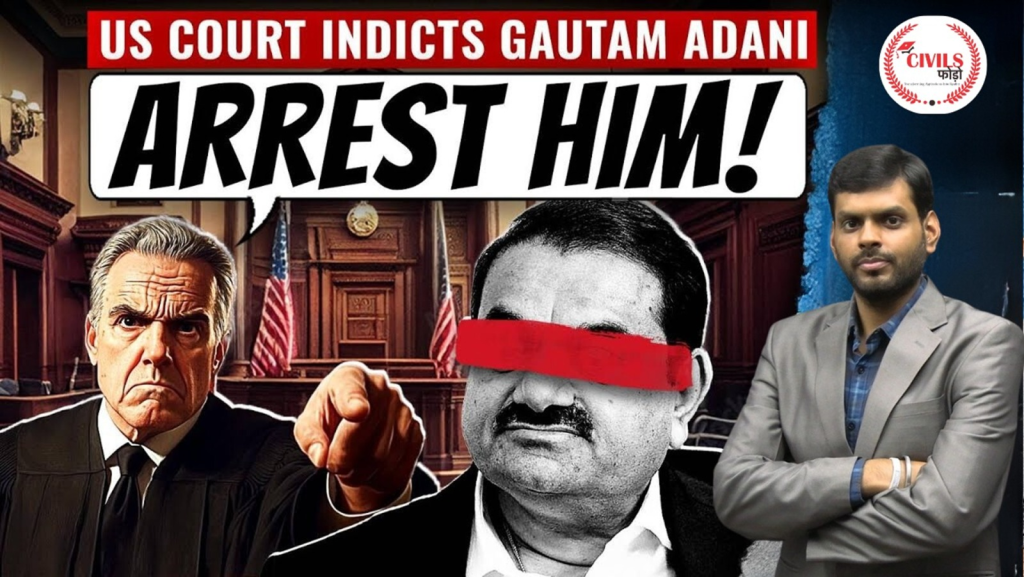
Context:
- Indian Billionaire industrialist Gautam Adani and several associates, including his nephew Sagar Adani, have been indicted by U.S. prosecutors on charges of fraud and bribery.
- Two separate charges have been filed:
- One by US Department of Justice.
- Another by US Security and Exchange Commission.
Update Until Now:
- Civil and criminal charges against Adani have been filed.
- Case could escalate significantly, potentially leading to arrest warrants and even extradition attempts.
- This charges left $12 billion hole in the tycoon’s pocket as his net worth plunged 17% to $57.7 billion according to Forbes data.
- Adani group was forced to withdraw a $600 million bond sale following the news.
What are the charges?

- Department of Justice has indicted Gautam Adani and others on various charges (5 count criminal indictment):
- Orchestrating a $250 million bribery scheme to secure lucrative green energy contracts in India.
- Violations of the Foreign Corrupt Practices Act, a US anti-bribery law.
- Securities and wire fraud.
- Made falls and misleading statements to US investors about its anti-bribery practices while engaging in wide spread corruption.
- Charges levelled by US securities and exchange commission:
- Of massive bribery scheme.
- Payments to foreign government officials to obtain or retain business.
Consequences of these charges:
- The DOJ indictment constitutes a criminal case.
- The SECs is a civil complaint and if proved could result in a
- Permanent injunction: It is issued as a final judgement that requires a person to do or stop doing a specific action.
- Civil penalty
- An officer and director bar:-
1. Most severe sanctions that an individual in an SEC fraud case can face.
2. Causes an instant end to a public company career
Response of Adani Group:
- Denied the allegations and called the indictment baseless move.
- The Adani Group said it has steadfastly maintained the highest possible standards of governance and transparency.
- It would seek all possible legal recourse.
Options before Adani:
- Can appeal in the case: There will be an impact on their funding and the project borrowing costs can go up.
- Can opt for settlement: As American law allows for settlement in bribery cases, often through Deferred Prosecution Agreement or Non-Prosecution Agreements. However such settlements would incur high costs:
- Substantial Monetary Penalties.
- Enhanced Compliance Measures and independent monitoring.
- Limited future restrictions such as reduced access to US funding

- In a January 2023 report, US based forensic financial research firm Hindenburg alleged that the Adani Group had been engaged in.
- Stock manipulation
- Accounting fraud scheme
- Creation of offshore shell companies in tax-haven Jurisdiction including UAE and Mauritius.
- As a result of this report, Adani Group’s shares plunged in value by about $112 billion.
- What is Short Selling?

- Short selling is a strategy where traders profit from a decline in the price of an asset, often a stock.
- In short selling, investors borrow shares of a stock they believe will fall in value, sell those shares on the open market, and later by them back at a lower price to return to the lender.
What happens next?
- This indictment in the US is a notification of the allegations only, meaning that Adani and his associates are still presumed innocent.
- The US could try to have all defendants extradited for a trial (however it is unclear if the Indian Government would allow).
- Adani also enjoys close ties to US President elect Donald Trump (Some suggest that Trump could put a stop to the case).
- Within US, the Adani Group may face an end to a public company career.
- Loss of market value of Adani Group.
- Loss of Confidence in Indian Investors like today only Kenyan President cancelled deal with Adani Group.
Conclusion:
The allegations against Gautam Adani and the Adani Group highlight the complexities of global business operations and the increasing scrutiny on corporate ethics. While these charges are yet to be proven, they emphasize the need for robust corporate governance, transparency, and accountability in multinational enterprises. The case also underscores the role of international laws in holding businesses accountable beyond their home countries. It remains critical for Indian businesses to address these concerns proactively to maintain global trust and market stability.
Preferred UPSC Questions:
GS Paper II (Governance, International Relations):
- Examine the implications of allegations like bribery and fraud by Indian corporations on India’s global reputation and diplomatic ties.
- How do international laws like the US Foreign Corrupt Practices Act impact Indian companies operating abroad?
- Discuss the extradition challenges that arise in cases involving allegations against Indian business leaders in foreign jurisdictions.
GS Paper III (Economy, Security):
- Assess the economic consequences of fraud allegations on major Indian conglomerates for domestic and international markets.
- What measures should regulatory bodies like SEBI adopt to ensure transparency and prevent financial misconduct in large corporations?
- Analyze the role of short selling in financial markets and its influence during corporate scandals.
GS Paper IV (Ethics, Integrity, and Aptitude):
- Discuss the ethical challenges faced by multinational corporations in maintaining transparency and compliance with anti-corruption laws.
- Evaluate the moral responsibilities of corporate leaders in safeguarding public trust during allegations of financial misconduct.
- How can corporations ensure adherence to ethical practices in jurisdictions with varying governance standards?
Essay Paper:
- “Corporate Responsibility in the Global Era: Balancing Profit with Integrity.”
- “The Interplay of Ethics, Governance, and Market Trust in Business Practices.”
These questions integrate topics of international governance, corporate ethics, and economic impacts, offering a comprehensive exploration aligned with UPSC’s analytical framework.






